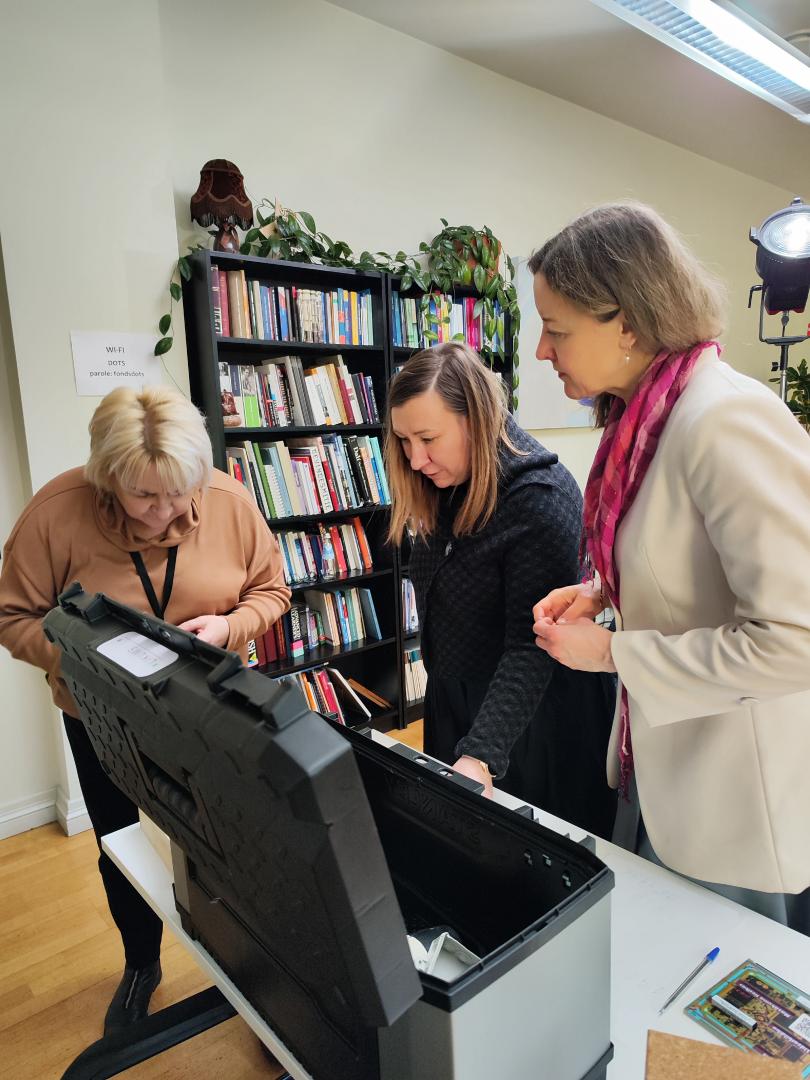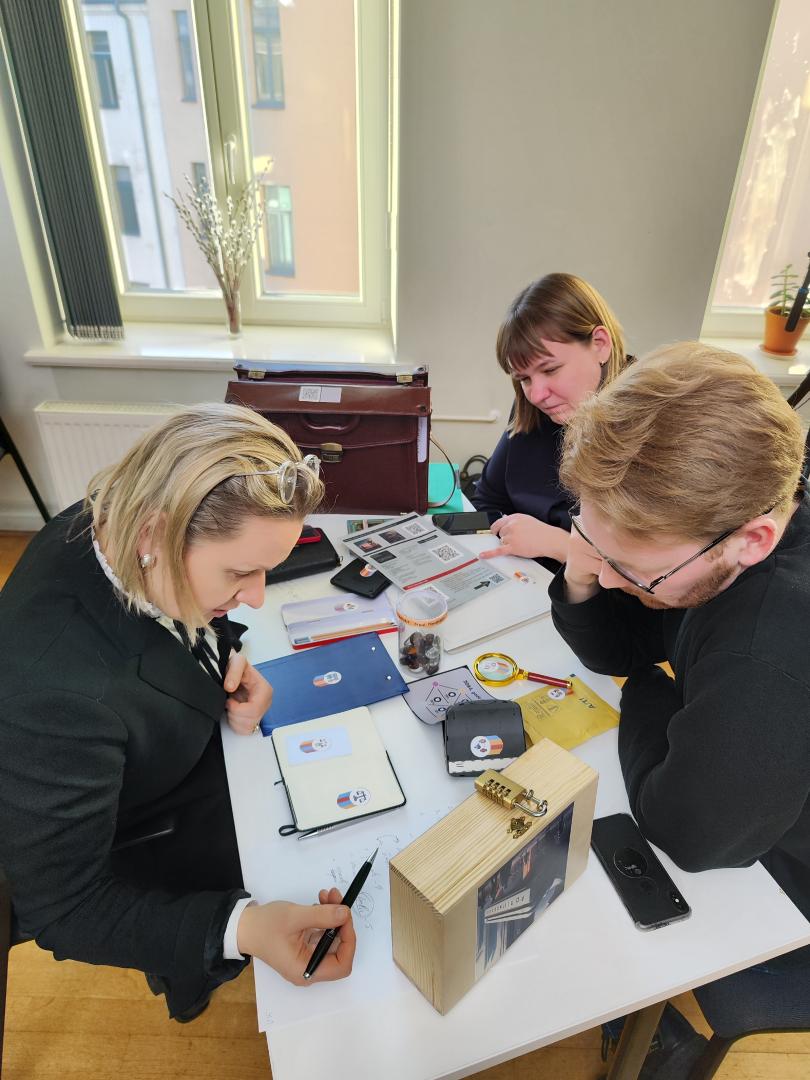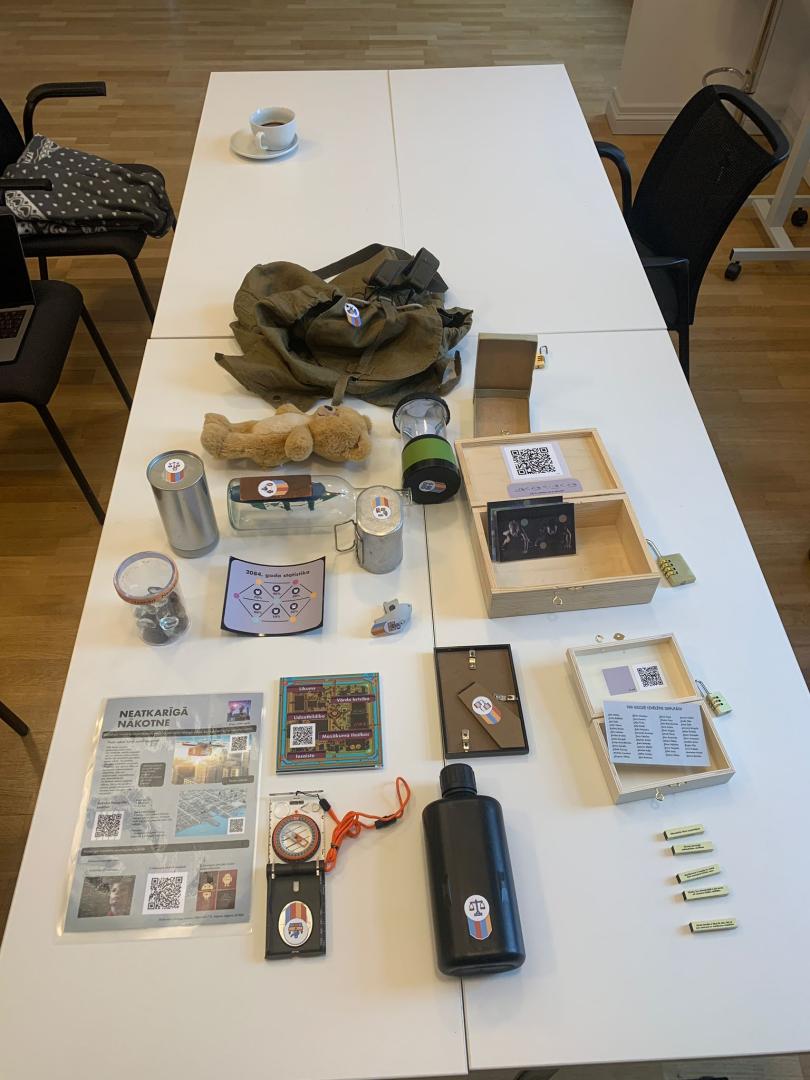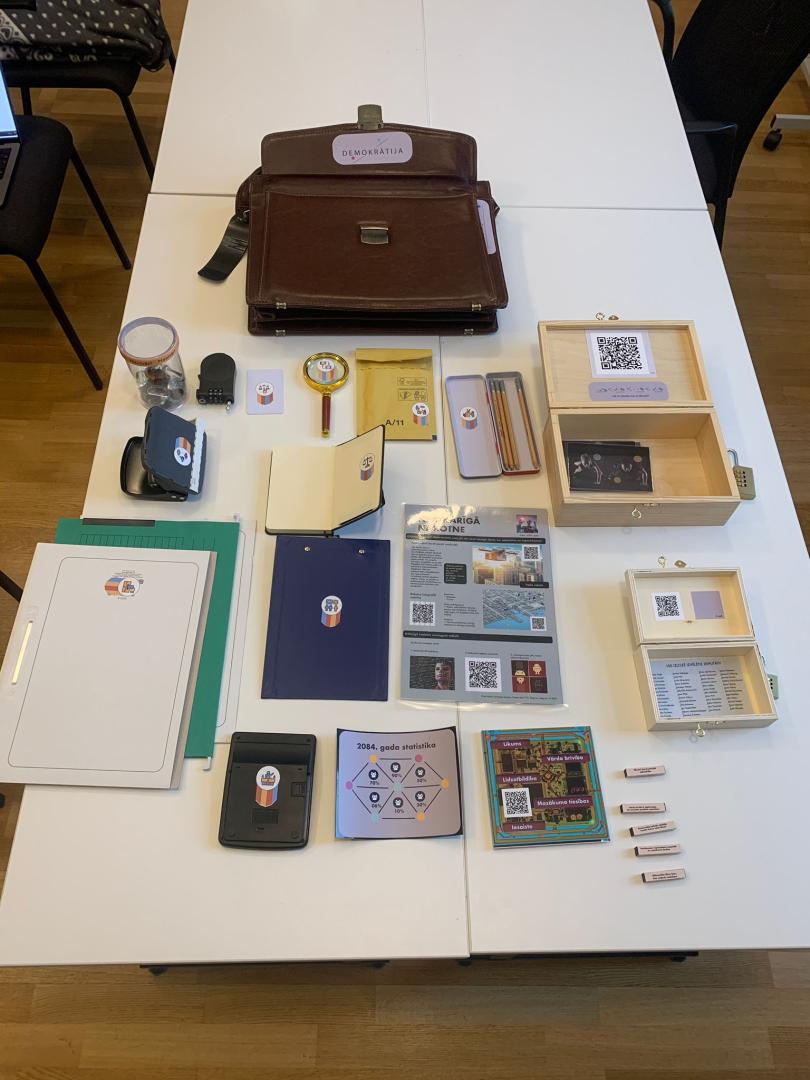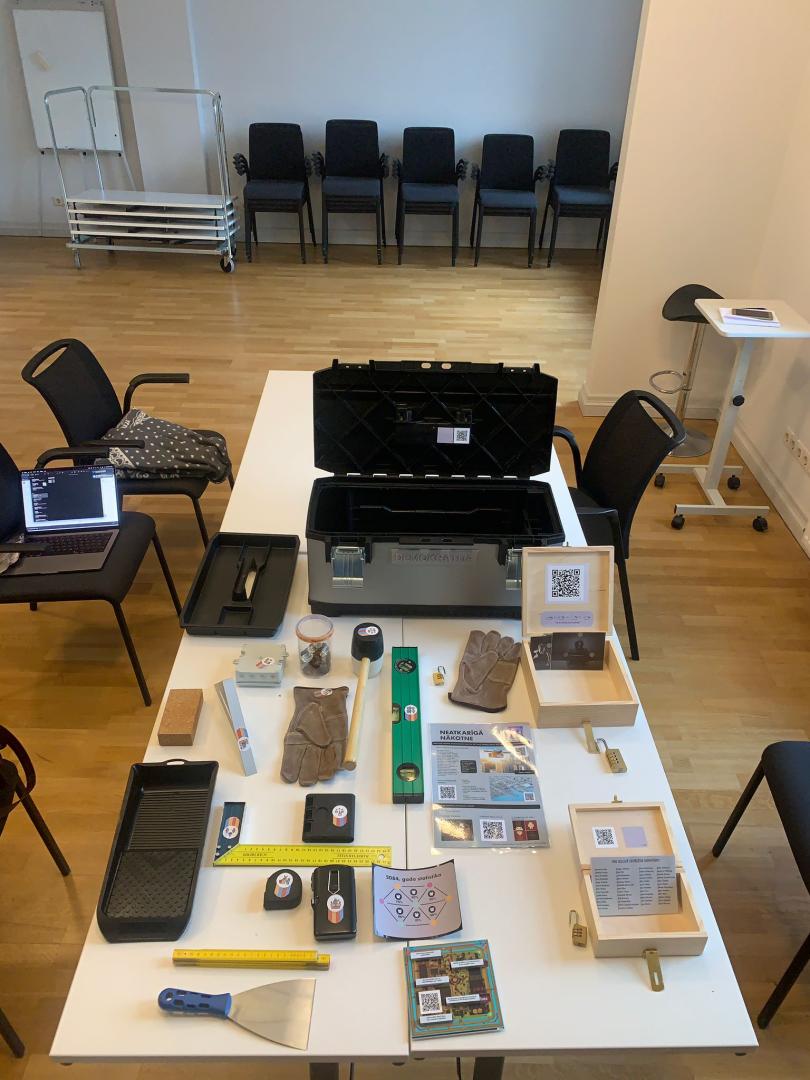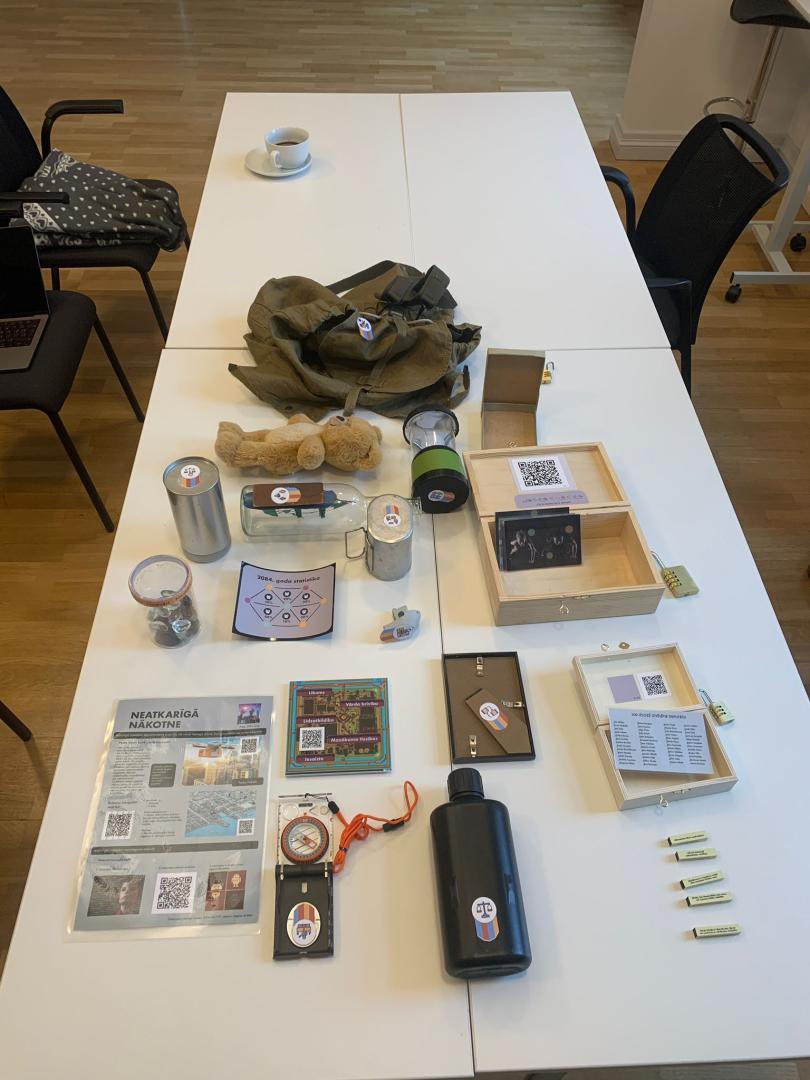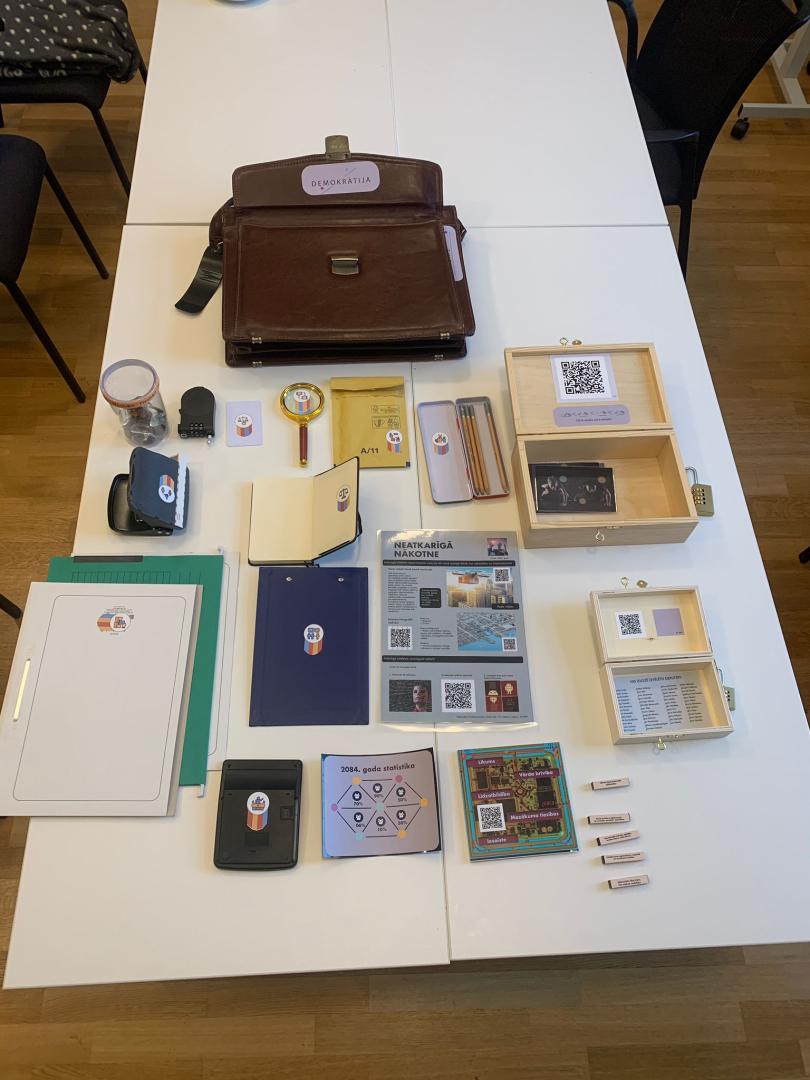Democracy 2084
Basic information
Project Title
Democracy 2084
Full project title
Democracy 2084
Category
Regaining a sense of belonging
Project Description
The game “Democracy 2084” is designed to strengthen people’s understanding of democratic values and processes. It is an escape room game that creates a dystopian vision of the collapse of a democratic state with purpose of the game is to show its players what life would be like without democratic values and what difficulties would they have to face if democratic systems no longer existed. The game is designed in a modular format, which makes it portable.
Geographical Scope
National
Project Region
Latvia
Urban or rural issues
It addresses urban-rural linkages
Physical or other transformations
It refers to other types of transformations (soft investment)
EU Programme or fund
Yes
Which funds
Other
Other Funds
Development of the game was financed by British Council and state budget. Game (civic education lessons) will be provided in schools also in the end of 2023, and during 2024.
Description of the project
Summary
The project "Creating Democracy Outside the Box: an Escape Game" aims to educate different target groups about the benefits of democracy, including civic participation, through a Escape room format.
The theme of the Escape room game is a dystopian vision of the collapse of a democratic state, to show players what life without democratic values would be like and the difficulties they face without democratic systems.
Overall objective: To promote citizens' civic and democratic participation.
Specific objectives:
- To increase citizens' awareness of democratic values and objectives;
- Improve citizens' knowledge of civic participation;
- Challenge populism.
The game is open to all target groups, but the main or priority is:
- Young people aged 14-25;
- Civically inactive persons or persons living in remote regions of Latvia.
Around 1000 people are educated till November 2023.
After playing the game, participants noted that they feel much more confident about their knowledge of democracy and democratic processes. During the game and in the post-game discussion, participants discuss and analyse different ways in which everyone can be civic active and participate in democratic processes and learn to identify activities that promote democracy, such as working in non-governmental organisations.
The theme of the Escape room game is a dystopian vision of the collapse of a democratic state, to show players what life without democratic values would be like and the difficulties they face without democratic systems.
Overall objective: To promote citizens' civic and democratic participation.
Specific objectives:
- To increase citizens' awareness of democratic values and objectives;
- Improve citizens' knowledge of civic participation;
- Challenge populism.
The game is open to all target groups, but the main or priority is:
- Young people aged 14-25;
- Civically inactive persons or persons living in remote regions of Latvia.
Around 1000 people are educated till November 2023.
After playing the game, participants noted that they feel much more confident about their knowledge of democracy and democratic processes. During the game and in the post-game discussion, participants discuss and analyse different ways in which everyone can be civic active and participate in democratic processes and learn to identify activities that promote democracy, such as working in non-governmental organisations.
Key objectives for sustainability
The project appears to be sustainable for several reasons:
Educational Value:
The game is designed to educate participants about the benefits of democracy, civic participation, and the importance of democratic values. By offering an engaging and interactive escape room format, it effectively conveys these crucial messages. The educational value of the game ensures its sustainability because it addresses an ongoing need for citizens to understand and actively engage in democratic processes.
Targeted Audience:
The project focuses on reaching specific target groups, including young people and civic inactive individuals or those living in remote regions of Latvia. By tailoring the experience to these groups, the project maximizes its impact and sustainability. Young people are the future of any democracy, and engaging them in a memorable experience can have a lasting effect on their understanding and participation in democratic processes. Additionally, targeting civic inactive or remote individuals helps bridge gaps in civic engagement, making the game an important tool for building a more inclusive and active society.
Measurable Impact:
The project's commitment to educating around 1000 people by November 2023, and the reported positive feedback from participants, demonstrate its effectiveness in achieving its objectives. Participants have expressed increased confidence in their knowledge of democracy and democratic processes, as well as a better understanding of how to be civically active. This measurable impact provides evidence of the project's sustainability, as it continues to make a positive difference in the community and encourages democratic participation over time.
Innovative approach:
The game has been developed in portable version, therefore it is possible to take a part in Escape room at a convenient place and time, and in safe mode. It means that there is no need for specific venue.
Educational Value:
The game is designed to educate participants about the benefits of democracy, civic participation, and the importance of democratic values. By offering an engaging and interactive escape room format, it effectively conveys these crucial messages. The educational value of the game ensures its sustainability because it addresses an ongoing need for citizens to understand and actively engage in democratic processes.
Targeted Audience:
The project focuses on reaching specific target groups, including young people and civic inactive individuals or those living in remote regions of Latvia. By tailoring the experience to these groups, the project maximizes its impact and sustainability. Young people are the future of any democracy, and engaging them in a memorable experience can have a lasting effect on their understanding and participation in democratic processes. Additionally, targeting civic inactive or remote individuals helps bridge gaps in civic engagement, making the game an important tool for building a more inclusive and active society.
Measurable Impact:
The project's commitment to educating around 1000 people by November 2023, and the reported positive feedback from participants, demonstrate its effectiveness in achieving its objectives. Participants have expressed increased confidence in their knowledge of democracy and democratic processes, as well as a better understanding of how to be civically active. This measurable impact provides evidence of the project's sustainability, as it continues to make a positive difference in the community and encourages democratic participation over time.
Innovative approach:
The game has been developed in portable version, therefore it is possible to take a part in Escape room at a convenient place and time, and in safe mode. It means that there is no need for specific venue.
Key objectives for aesthetics and quality
Immersive Aesthetics:The Escape room format: The project's choice of an escape room format ensures an immersive and engaging experience for participants. The design of the escape room incorporates elements that mirror a dystopian vision of a collapsed democratic state, creating an atmosphere that evokes the consequences of a lack of democratic values. The design elements include the physical setting, props, and interactive puzzles, all of which contribute to the immersive aesthetics of the game.
Storytelling: The game uses storytelling to convey its message. Through a compelling narrative, participants are transported into a dystopian world where democratic values are absent, allowing them to experience the consequences firsthand. This narrative approach enhances the aesthetic and emotional appeal of the game.
Cultural and Educational Benefits:
Cultural Sensitivity: The project's design and content take into account the cultural and social context of Latvia. It addresses the specific challenges and issues that the Latvian society faces concerning civic participation and democracy. This cultural sensitivity ensures that the game is relevant and relatable to its target audience.
Promoting Democratic Values: By creating a dystopian scenario, the game highlights the importance of democratic values and the potential consequences of their absence. It encourages players to reflect on the cultural and societal significance of democracy, fostering a deeper understanding of their role in upholding these values.
Inclusivity: The project's focus on reaching young people and individuals in remote regions of Latvia reflects a commitment to inclusivity. By making the game accessible to a diverse range of participants, it helps bridge cultural and geographical gaps, promoting democratic values in different cultural contexts.
Storytelling: The game uses storytelling to convey its message. Through a compelling narrative, participants are transported into a dystopian world where democratic values are absent, allowing them to experience the consequences firsthand. This narrative approach enhances the aesthetic and emotional appeal of the game.
Cultural and Educational Benefits:
Cultural Sensitivity: The project's design and content take into account the cultural and social context of Latvia. It addresses the specific challenges and issues that the Latvian society faces concerning civic participation and democracy. This cultural sensitivity ensures that the game is relevant and relatable to its target audience.
Promoting Democratic Values: By creating a dystopian scenario, the game highlights the importance of democratic values and the potential consequences of their absence. It encourages players to reflect on the cultural and societal significance of democracy, fostering a deeper understanding of their role in upholding these values.
Inclusivity: The project's focus on reaching young people and individuals in remote regions of Latvia reflects a commitment to inclusivity. By making the game accessible to a diverse range of participants, it helps bridge cultural and geographical gaps, promoting democratic values in different cultural contexts.
Key objectives for inclusion
Accessibility:
Diverse Target Groups: The project's primary focus on young people aged 14-25 and civically inactive individuals or those living in remote regions of Latvia reflects a commitment to accessibility. By reaching out to these specific groups, the project aims to be inclusive and ensure that a wide range of participants can engage with its content.
Physical Accessibility: The game's escape room format is designed to be physically accessible, allowing people of varying physical abilities to participate. It ensures that the physical design of the game accommodates different needs, making it an inclusive experience.
Cultural Accessibility: The project is designed to be culturally sensitive and conducted in a way that is accessible to participants with different backgrounds, ensuring that cultural diversity is respected.
Affordability:
Low-Cost or Free Access: While the project doesn't explicitly state its pricing model, its objective to educate around 1000 people suggests that it values affordability. Offering low-cost to the game would further enhance its inclusivity, ensuring that financial constraints do not hinder participation.
Inclusive Governing Systems and Societal Models:
Promotion of Democracy: The core theme of the project, which presents a dystopian vision of the collapse of a democratic state, underscores the importance of inclusive governing systems. It encourages participants to reflect on the consequences of losing democratic values, fostering a commitment to inclusive and participatory governance.
Cultural and Social Inclusivity: The project recognizes the cultural and social diversity within Latvia and aims to promote democratic values across different communities. By addressing the specific challenges faced by remote regions, it works towards a more inclusive societal model where every citizen has a voice and equal access to democratic processes.
Diverse Target Groups: The project's primary focus on young people aged 14-25 and civically inactive individuals or those living in remote regions of Latvia reflects a commitment to accessibility. By reaching out to these specific groups, the project aims to be inclusive and ensure that a wide range of participants can engage with its content.
Physical Accessibility: The game's escape room format is designed to be physically accessible, allowing people of varying physical abilities to participate. It ensures that the physical design of the game accommodates different needs, making it an inclusive experience.
Cultural Accessibility: The project is designed to be culturally sensitive and conducted in a way that is accessible to participants with different backgrounds, ensuring that cultural diversity is respected.
Affordability:
Low-Cost or Free Access: While the project doesn't explicitly state its pricing model, its objective to educate around 1000 people suggests that it values affordability. Offering low-cost to the game would further enhance its inclusivity, ensuring that financial constraints do not hinder participation.
Inclusive Governing Systems and Societal Models:
Promotion of Democracy: The core theme of the project, which presents a dystopian vision of the collapse of a democratic state, underscores the importance of inclusive governing systems. It encourages participants to reflect on the consequences of losing democratic values, fostering a commitment to inclusive and participatory governance.
Cultural and Social Inclusivity: The project recognizes the cultural and social diversity within Latvia and aims to promote democratic values across different communities. By addressing the specific challenges faced by remote regions, it works towards a more inclusive societal model where every citizen has a voice and equal access to democratic processes.
Results in relation to category
Increased Awareness of Democratic Values: The project has successfully raised awareness among participants about the fundamental principles of democracy, such as the rule of law, individual freedoms, and political pluralism.
Improved Knowledge of Civic Participation: Participants have acquired a deeper understanding of the importance of civic participation and the various ways they can engage in democratic processes.
Enhanced Critical Thinking: The immersive and interactive nature of the escape room game has fostered critical thinking skills among participants, enabling them to assess information critically, differentiate between populism and democratic values, and make informed decisions.
Youth Engagement: The project has successfully engaged young people, a demographic often characterized by low civic participation. This engagement has the potential to create a lasting impact on their future civic involvement.
Geographical Inclusion: By targeting individuals in remote regions, the project has bridged geographical gaps in civic education and participation, making democracy promotion more inclusive.
Impacts:
Increased Civic Participation: Participants are more likely to actively engage in democratic processes, such as voting, participating in community organizations, or advocating for democratic values.
Counteracting Populism: By challenging populism and promoting democratic values, the project has contributed to the prevention of democratic erosion and the rise of illiberal ideologies.
Empowered and Informed Citizens: The project has empowered citizens with the knowledge and skills to actively contribute to their communities and advocate for democratic principles, resulting in more informed and engaged citizens.
Community Building: Post-game discussions have fostered a sense of community and encouraged participants to collaborate on civic initiatives, enhancing social cohesion.
Improved Knowledge of Civic Participation: Participants have acquired a deeper understanding of the importance of civic participation and the various ways they can engage in democratic processes.
Enhanced Critical Thinking: The immersive and interactive nature of the escape room game has fostered critical thinking skills among participants, enabling them to assess information critically, differentiate between populism and democratic values, and make informed decisions.
Youth Engagement: The project has successfully engaged young people, a demographic often characterized by low civic participation. This engagement has the potential to create a lasting impact on their future civic involvement.
Geographical Inclusion: By targeting individuals in remote regions, the project has bridged geographical gaps in civic education and participation, making democracy promotion more inclusive.
Impacts:
Increased Civic Participation: Participants are more likely to actively engage in democratic processes, such as voting, participating in community organizations, or advocating for democratic values.
Counteracting Populism: By challenging populism and promoting democratic values, the project has contributed to the prevention of democratic erosion and the rise of illiberal ideologies.
Empowered and Informed Citizens: The project has empowered citizens with the knowledge and skills to actively contribute to their communities and advocate for democratic principles, resulting in more informed and engaged citizens.
Community Building: Post-game discussions have fostered a sense of community and encouraged participants to collaborate on civic initiatives, enhancing social cohesion.
How Citizens benefit
Playtesting and Feedback:
Citizens' Role: Playtesting sessions with citizens and participants have been organized to obtain direct feedback on the game's content, educational value, and overall experience. Their insights and opinions are considered in refining the game.
Impact: Incorporating feedback from citizens ensures that the game is fine-tuned to be as effective and engaging as possible. This iterative process enhances the game's quality and educational value, resulting in a more meaningful experience for participants.
Partnerships with NGOs and Civil Society Organizations:
Civil Society's Role: The project collaborates with non-governmental organizations (NGOs) and civil society groups. These organizations are often experts in civic engagement and democracy. Their involvement includes providing resources, expertise, and support in promoting democratic values and civic participation.
Impact: Collaborating with NGOs and civil society organizations strengthens the project's impact by leveraging the knowledge and reach of these groups. It allows for a broader dissemination of the project's message and encourages participants to engage in civic activities beyond the game.
Post-Game Discussions and Workshops:
Citizens' and Civil Society's Role: Participants engage in post-game discussions and workshops facilitated by representatives from civil society organizations. These discussions provide a platform for participants to share their thoughts, concerns, and ideas related to democracy and civic engagement.
Impact: These discussions empower participants to express their opinions, learn from one another, and explore different ways to be civic active. Civil society representatives can provide valuable insights and resources, further enhancing the impact of the project by fostering ongoing civic engagement.
Citizens' Role: Playtesting sessions with citizens and participants have been organized to obtain direct feedback on the game's content, educational value, and overall experience. Their insights and opinions are considered in refining the game.
Impact: Incorporating feedback from citizens ensures that the game is fine-tuned to be as effective and engaging as possible. This iterative process enhances the game's quality and educational value, resulting in a more meaningful experience for participants.
Partnerships with NGOs and Civil Society Organizations:
Civil Society's Role: The project collaborates with non-governmental organizations (NGOs) and civil society groups. These organizations are often experts in civic engagement and democracy. Their involvement includes providing resources, expertise, and support in promoting democratic values and civic participation.
Impact: Collaborating with NGOs and civil society organizations strengthens the project's impact by leveraging the knowledge and reach of these groups. It allows for a broader dissemination of the project's message and encourages participants to engage in civic activities beyond the game.
Post-Game Discussions and Workshops:
Citizens' and Civil Society's Role: Participants engage in post-game discussions and workshops facilitated by representatives from civil society organizations. These discussions provide a platform for participants to share their thoughts, concerns, and ideas related to democracy and civic engagement.
Impact: These discussions empower participants to express their opinions, learn from one another, and explore different ways to be civic active. Civil society representatives can provide valuable insights and resources, further enhancing the impact of the project by fostering ongoing civic engagement.
Physical or other transformations
It refers to other types of transformations (soft investment)
Innovative character
Engaging Learning Format:
Innovation: The use of an escape room format for educating participants about democracy and civic participation is highly innovative. This format offers an immersive and interactive learning experience, which is not common in mainstream civic education initiatives.
Added Value: This unique approach captivates participants, making learning about democracy more exciting and memorable. It goes beyond traditional classroom methods, enhancing engagement and retention of information.
Dystopian Simulation:
Innovation: The project's use of a dystopian scenario to convey the consequences of a lack of democratic values is innovative. While mainstream actions may focus on theoretical or historical examples, this project provides a hands-on experience of a fictional, but highly relevant, scenario.
Added Value: The dystopian simulation makes the consequences of democracy's absence more tangible and relatable to participants. It elicits emotional responses and fosters a deeper understanding of the importance of democratic values.
Targeting Underrepresented Groups:
Innovation: Prioritizing young people aged 14-25 and civic inactive individuals or those in remote regions of Latvia is innovative. Many mainstream civic education initiatives may not specifically focus on these marginalized or disengaged groups.
Added Value: By addressing these specific demographics, the project works towards inclusivity and offers a unique opportunity to reach those who are often left out of mainstream democratic education efforts. It ensures that democracy education reaches a broader and more diverse audience.
Innovation: The use of an escape room format for educating participants about democracy and civic participation is highly innovative. This format offers an immersive and interactive learning experience, which is not common in mainstream civic education initiatives.
Added Value: This unique approach captivates participants, making learning about democracy more exciting and memorable. It goes beyond traditional classroom methods, enhancing engagement and retention of information.
Dystopian Simulation:
Innovation: The project's use of a dystopian scenario to convey the consequences of a lack of democratic values is innovative. While mainstream actions may focus on theoretical or historical examples, this project provides a hands-on experience of a fictional, but highly relevant, scenario.
Added Value: The dystopian simulation makes the consequences of democracy's absence more tangible and relatable to participants. It elicits emotional responses and fosters a deeper understanding of the importance of democratic values.
Targeting Underrepresented Groups:
Innovation: Prioritizing young people aged 14-25 and civic inactive individuals or those in remote regions of Latvia is innovative. Many mainstream civic education initiatives may not specifically focus on these marginalized or disengaged groups.
Added Value: By addressing these specific demographics, the project works towards inclusivity and offers a unique opportunity to reach those who are often left out of mainstream democratic education efforts. It ensures that democracy education reaches a broader and more diverse audience.
Disciplines/knowledge reflected
Education and Pedagogy:
Role: Experts in education were involved in designing the educational aspects of the game. They have been responsible for structuring the learning objectives, content, and teaching methods within the game.
Added Value: Their involvement ensures that the project aligns with sound pedagogical principles, making the educational experience effective and engaging.
Game Design and Interactive Media:
Role: Game designers and experts in interactive media have played a crucial role in developing the game's mechanics, narrative, and interactive elements. They ensured that the game is engaging and immersive.
Added Value: Their expertise enhances the game's entertainment value, making it more appealing to the target audience. The interactivity and game mechanics create a dynamic learning experience that resonates with participants.
Political Science:
Role: Specialists in political science have contributed to the content and thematic elements of the game. They helped ensure that the project accurately reflects democratic principles and challenges.
Added Value: Their involvement ensures that the project is grounded in academic research and aligns with the core concepts of democracy. It provides a strong educational foundation for participants.
Technology:
Role: Technologists have contributed to the project's digital components and made sure that it is accessible to a wide range of participants, including those with disabilities.
Added Value: Their expertise ensures that the project is technologically sound, meets accessibility standards, and reaches a broader audience.
Role: Experts in education were involved in designing the educational aspects of the game. They have been responsible for structuring the learning objectives, content, and teaching methods within the game.
Added Value: Their involvement ensures that the project aligns with sound pedagogical principles, making the educational experience effective and engaging.
Game Design and Interactive Media:
Role: Game designers and experts in interactive media have played a crucial role in developing the game's mechanics, narrative, and interactive elements. They ensured that the game is engaging and immersive.
Added Value: Their expertise enhances the game's entertainment value, making it more appealing to the target audience. The interactivity and game mechanics create a dynamic learning experience that resonates with participants.
Political Science:
Role: Specialists in political science have contributed to the content and thematic elements of the game. They helped ensure that the project accurately reflects democratic principles and challenges.
Added Value: Their involvement ensures that the project is grounded in academic research and aligns with the core concepts of democracy. It provides a strong educational foundation for participants.
Technology:
Role: Technologists have contributed to the project's digital components and made sure that it is accessible to a wide range of participants, including those with disabilities.
Added Value: Their expertise ensures that the project is technologically sound, meets accessibility standards, and reaches a broader audience.
Methodology used
Assessment and Target Audience Identification:
It was started to identify the specific gaps in understanding democratic values and civic participation within the target audience. It was identified that the primary and secondary target groups, which include young people aged 14-25 and civic inactive individuals in remote regions.
Content Development:
There were collaboration with experts in political science, education, and game design to develop the content, objectives, and educational materials for the game. In results, there were created a narrative that portrays a dystopian vision of a collapsed democratic state to convey the consequences of a lack of democratic values.
Game Design and Development:
There were work with game designers and developers to create the escape room experience, including the physical setting, puzzles, interactive elements, and storyline. It ensure that the game is engaging, immersive, and aligned with the educational objectives.
Targeted Outreach and Promotion:
There were developed a targeted outreach strategy to reach the intended audience, including partnerships with local schools. Used digital and social media platforms to promote the project and attract participants.
Implementation and Education:
There were organized game sessions, ensuring that they are physically accessible and affordable, as much as possible.Facilitated game sessions, provided guidance and assistanced to participants as needed.
Post-Game Discussions:
There were hosted post-game discussions with the participation. It encouraged participants to reflect on their experiences and explore ways to be civic active.
Evaluation and Feedback:
There were collected feedback from participants to evaluate the impact of the game on their knowledge and attitudes towards democracy and civic participation. This feedback is used to refine and improve the game and educational content.
It was started to identify the specific gaps in understanding democratic values and civic participation within the target audience. It was identified that the primary and secondary target groups, which include young people aged 14-25 and civic inactive individuals in remote regions.
Content Development:
There were collaboration with experts in political science, education, and game design to develop the content, objectives, and educational materials for the game. In results, there were created a narrative that portrays a dystopian vision of a collapsed democratic state to convey the consequences of a lack of democratic values.
Game Design and Development:
There were work with game designers and developers to create the escape room experience, including the physical setting, puzzles, interactive elements, and storyline. It ensure that the game is engaging, immersive, and aligned with the educational objectives.
Targeted Outreach and Promotion:
There were developed a targeted outreach strategy to reach the intended audience, including partnerships with local schools. Used digital and social media platforms to promote the project and attract participants.
Implementation and Education:
There were organized game sessions, ensuring that they are physically accessible and affordable, as much as possible.Facilitated game sessions, provided guidance and assistanced to participants as needed.
Post-Game Discussions:
There were hosted post-game discussions with the participation. It encouraged participants to reflect on their experiences and explore ways to be civic active.
Evaluation and Feedback:
There were collected feedback from participants to evaluate the impact of the game on their knowledge and attitudes towards democracy and civic participation. This feedback is used to refine and improve the game and educational content.
How stakeholders are engaged
Local Stakeholders:
Local stakeholders such as municipalities and schools have been engaged in the project. They have played a role in identifying potential participants, spreading awareness about the game, and providing valuable insights on local challenges and opportunities for civic engagement.
Regional Stakeholders:
Regional government bodies, regional NGOs, and regional educational institutions are among the regional stakeholders involved in the project. They provide resources, support, and expertise, as well as help in organizing and coordinating events related to the project.
National Stakeholders:
National government agencies, educational authorities, and prominent NGOs working on civic education and democracy engaged in the project. They provide access to educational institutions for project implementation.
Local stakeholders such as municipalities and schools have been engaged in the project. They have played a role in identifying potential participants, spreading awareness about the game, and providing valuable insights on local challenges and opportunities for civic engagement.
Regional Stakeholders:
Regional government bodies, regional NGOs, and regional educational institutions are among the regional stakeholders involved in the project. They provide resources, support, and expertise, as well as help in organizing and coordinating events related to the project.
National Stakeholders:
National government agencies, educational authorities, and prominent NGOs working on civic education and democracy engaged in the project. They provide access to educational institutions for project implementation.
Global challenges
Decline in Civic Engagement: Low civic engagement and voter apathy are global challenges that affect democracies worldwide. The project's local solution engages participants in a hands-on experience that can serve as a model for other regions. It encourages individuals to become active participants in their communities and in democratic processes, which can help combat declining civic engagement.
Populism and Democratic Erosion: Populism and the erosion of democratic values are global concerns. By challenging populism and promoting democratic values, the project provides a localized response to a global issue. It empowers individuals to critically assess the consequences of populist ideologies and the importance of democratic principles.
Educational Gaps in Civic Education: A lack of comprehensive democracy education is a challenge in many countries. The project offers a local educational solution by providing an immersive, engaging, and interactive experience that educates participants about democratic values. This approach can be adapted and scaled to address educational gaps in other regions.
Inequality and Marginalization: Addressing the needs of underrepresented and marginalized groups is a global challenge. The project prioritizes young people and those living in remote regions, showcasing how local solutions can be tailored to target specific marginalized demographics and promote inclusivity.
Engaging the Youth: Encouraging young people to become active participants in democracy is a worldwide challenge. By focusing on engaging young people, the project provides a local model for harnessing the potential of youth in democratic processes.
Educational Innovation: Innovating in democracy education is a challenge faced globally. The project's use of escape room education, immersive experiences, and storytelling techniques exemplifies how innovative and engaging methods can be employed to teach complex concepts effectively.
Populism and Democratic Erosion: Populism and the erosion of democratic values are global concerns. By challenging populism and promoting democratic values, the project provides a localized response to a global issue. It empowers individuals to critically assess the consequences of populist ideologies and the importance of democratic principles.
Educational Gaps in Civic Education: A lack of comprehensive democracy education is a challenge in many countries. The project offers a local educational solution by providing an immersive, engaging, and interactive experience that educates participants about democratic values. This approach can be adapted and scaled to address educational gaps in other regions.
Inequality and Marginalization: Addressing the needs of underrepresented and marginalized groups is a global challenge. The project prioritizes young people and those living in remote regions, showcasing how local solutions can be tailored to target specific marginalized demographics and promote inclusivity.
Engaging the Youth: Encouraging young people to become active participants in democracy is a worldwide challenge. By focusing on engaging young people, the project provides a local model for harnessing the potential of youth in democratic processes.
Educational Innovation: Innovating in democracy education is a challenge faced globally. The project's use of escape room education, immersive experiences, and storytelling techniques exemplifies how innovative and engaging methods can be employed to teach complex concepts effectively.
Learning transferred to other parties
Educational Content:
The educational content and curriculum developed for the game can be adapted and replicated in different locations and contexts. The core principles of democracy, civic participation, and the consequences of democratic values can be applied universally.
Escape Room Format:
The use of the escape room format as an educational tool is highly transferable. This format can be recreated and adapted to various physical or digital environments, allowing for its implementation in different places and for different audiences.
Narrative:
The narrative approach that portrays a dystopian vision of a collapsed democratic state is a powerful way to convey the importance of democracy. This storytelling technique can be replicated in other educational initiatives to engage and educate participants.
Targeted Outreach and Engagement Strategies:
The strategies used for targeted outreach, can be applied in other contexts to reach specific beneficiary groups effectively.
Post-Game Discussions:
The idea of facilitating post-game discussions and workshops, where participants reflect on their experiences and explore civic engagement opportunities, is a replicable model. It can be integrated into other projects to encourage active participation and learning.
Assessment and Evaluation Framework:
The evaluation methods and feedback mechanisms used to measure the impact of the game can be transferred to assess the effectiveness of other democracy education initiatives. This framework provides insights for improvement.
Inclusivity and Accessibility Principles:
The project's emphasis on inclusivity and accessibility, particularly in reaching underrepresented groups and making the game physically accessible, offers valuable lessons for replicating similar initiatives.
Use of Digital and Social Media:
Leveraging digital and social media platforms for project promotion can be applied in various contexts to reach and engage a broader audience.
The educational content and curriculum developed for the game can be adapted and replicated in different locations and contexts. The core principles of democracy, civic participation, and the consequences of democratic values can be applied universally.
Escape Room Format:
The use of the escape room format as an educational tool is highly transferable. This format can be recreated and adapted to various physical or digital environments, allowing for its implementation in different places and for different audiences.
Narrative:
The narrative approach that portrays a dystopian vision of a collapsed democratic state is a powerful way to convey the importance of democracy. This storytelling technique can be replicated in other educational initiatives to engage and educate participants.
Targeted Outreach and Engagement Strategies:
The strategies used for targeted outreach, can be applied in other contexts to reach specific beneficiary groups effectively.
Post-Game Discussions:
The idea of facilitating post-game discussions and workshops, where participants reflect on their experiences and explore civic engagement opportunities, is a replicable model. It can be integrated into other projects to encourage active participation and learning.
Assessment and Evaluation Framework:
The evaluation methods and feedback mechanisms used to measure the impact of the game can be transferred to assess the effectiveness of other democracy education initiatives. This framework provides insights for improvement.
Inclusivity and Accessibility Principles:
The project's emphasis on inclusivity and accessibility, particularly in reaching underrepresented groups and making the game physically accessible, offers valuable lessons for replicating similar initiatives.
Use of Digital and Social Media:
Leveraging digital and social media platforms for project promotion can be applied in various contexts to reach and engage a broader audience.
Keywords
Democracy
Citizens
Civic education
Lifelong Learning
Innovative

